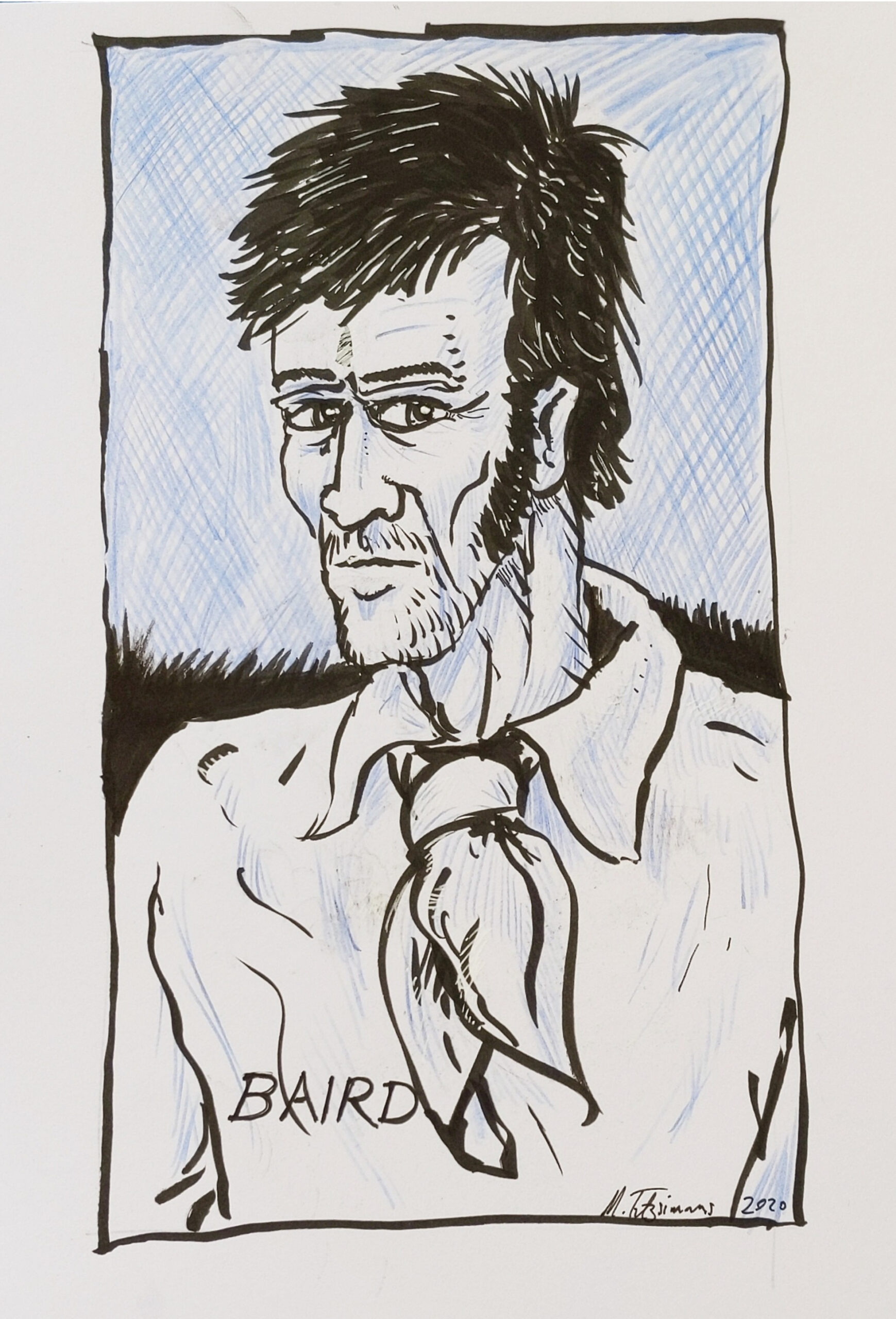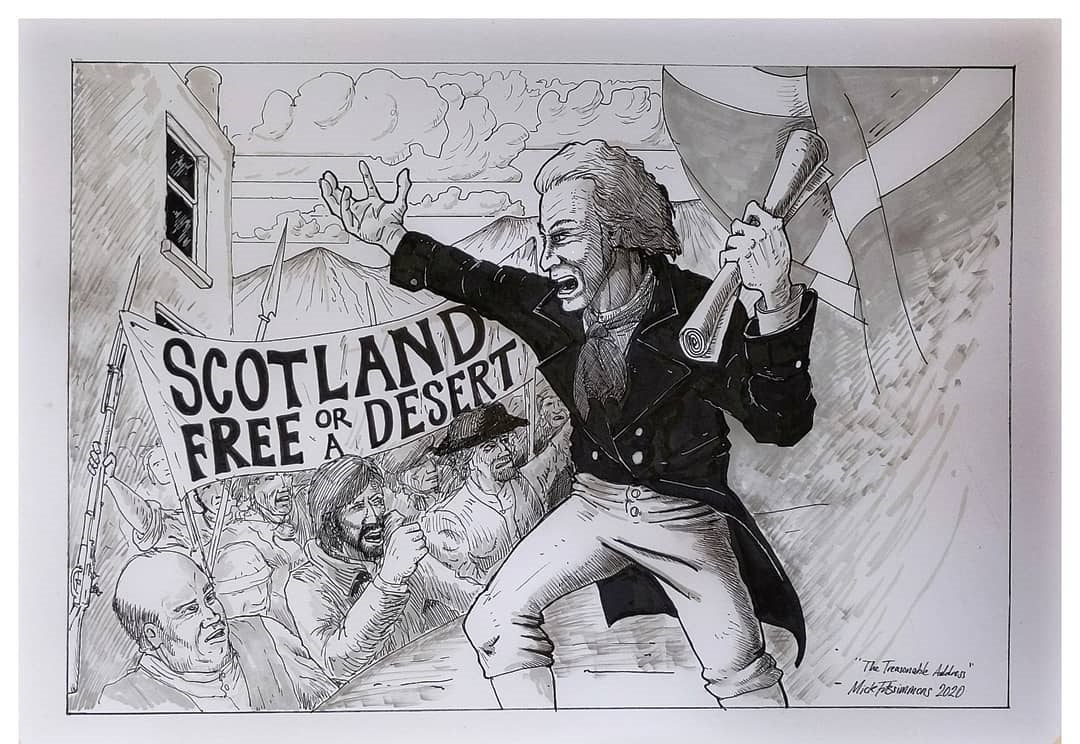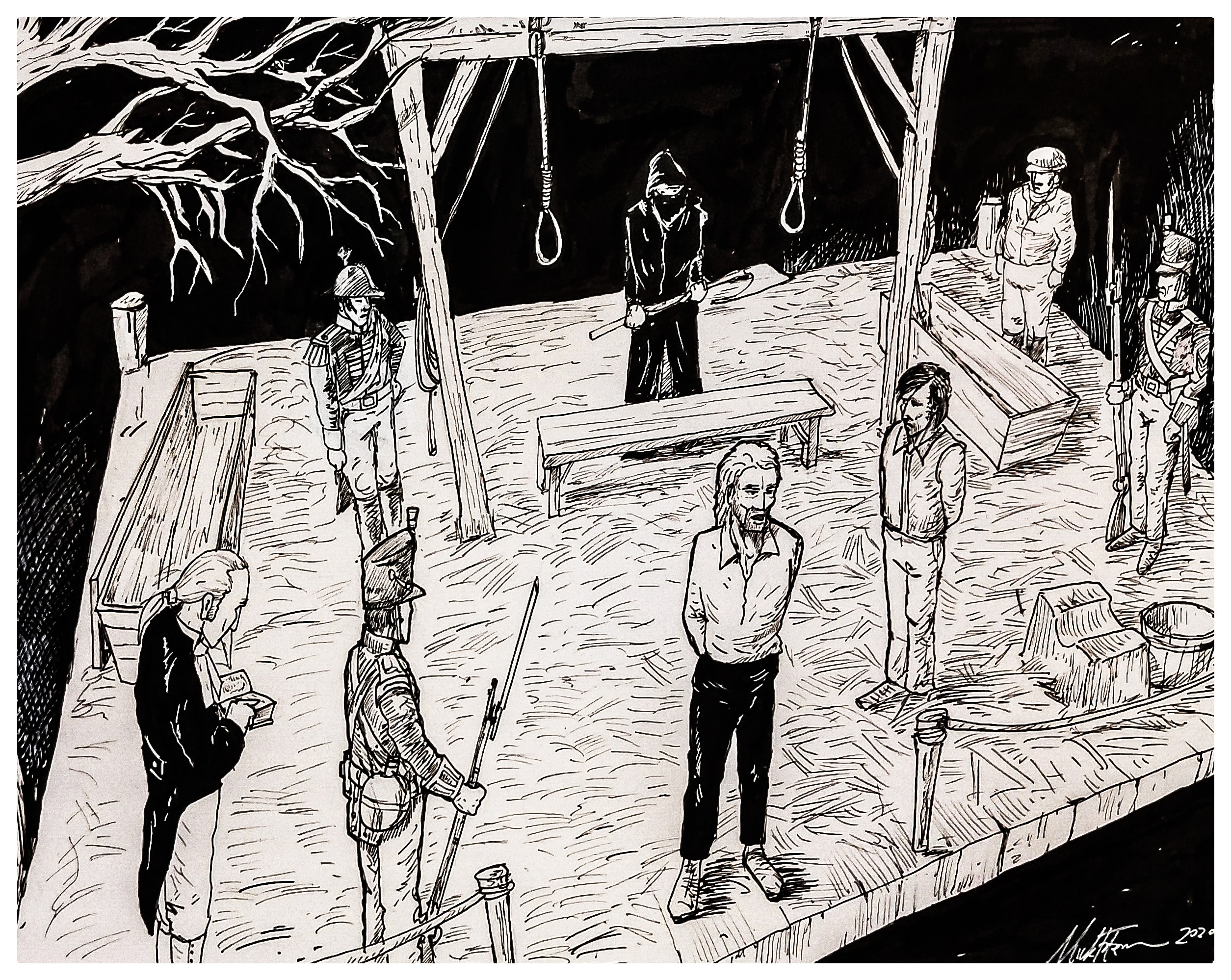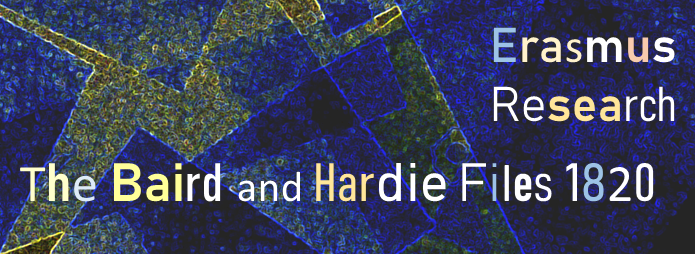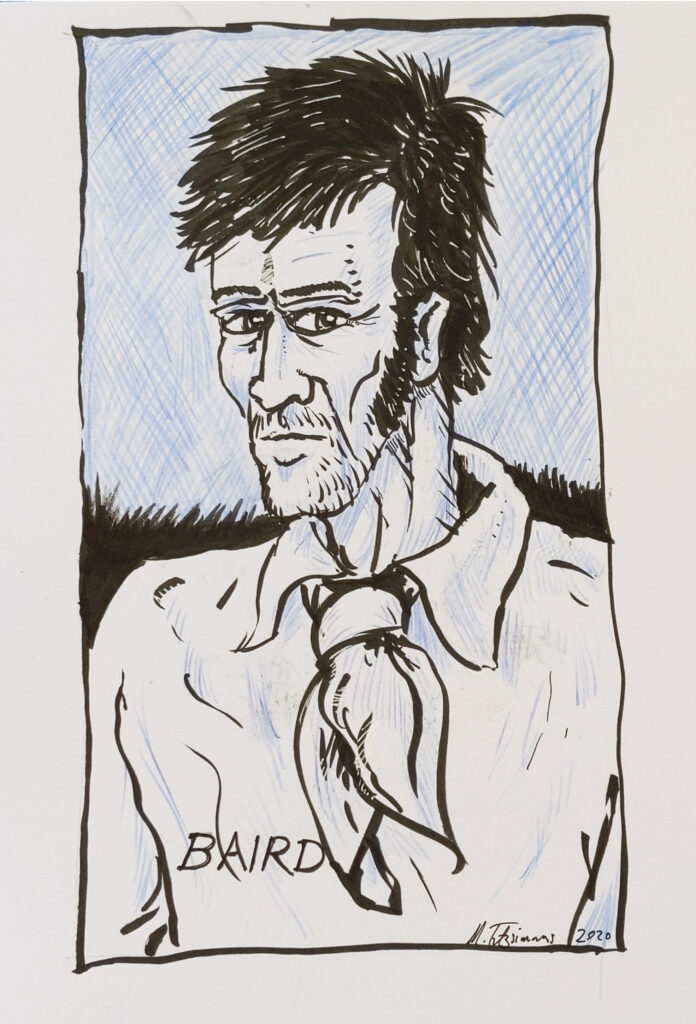
This is the first section of Chapter XII of the serialisation, the wording reproduced exactly as it appeared in the Stirling Sentinel, on Tuesday 30th April 1889.
Trial of John Baird – The Names of the Jurymen – Skirmishing between the Counsel – The Six Months Bill – Verdict of the Jury
The Court met at ten o’clock a.m. on Friday, 14th July 1820, for the trial of John Baird, who was placed at the bar with the other untried prisoners behind him. The Clerk gave his prisoner his challenge in the usual form, and proceeded to call over the names of the jury, beginning by consent of the Lord Advocate and the counsel for the prisoner, from that part of the panel at which he had left off on the trial of Andrew Hardie, and as each juryman answered to his name, the Clerk put to him the usual questions as to being possessed of freehold property to the value of 40s. The following were the names called out: –
John Mitchel, tanner – sworn.
Thomas Smart, tanner – sworn.
Alexander Robertson of Candy, gentleman – challenged by the prisoner.
James Hodge, baker – sworn.
George McCallum, of Thornhill, Esq. – challenged by the prisoner.
John Callander, of Lady’s-mill, gentleman – challenged by the prisoner.
Alexander Balloch, of Middlefield, gentleman – challenged by the prisoner.
John Hugh, of Gartcows, gentleman – challenged by the prisoner.
John Mitchell, of Mungall-mill, gentleman – challenged by the prisoner.
John Burns, writer – challenged by the prisoner.
Peter Bell, merchant – sworn.
Robert McKechnie, writer – challenged by the prisoner.
William Storie, writer – sworn.
Alexander Monro, writer – sworn.
John Thomson, vintner – challenged by the prisoner.
James McPherson, vintner – challenged by the prisoner.
Colin McNab, of Grangemouth, merchant – challenged by the prisoner.
James Milne, merchant – challenged by the prisoner.
Arthur Pollock, merchant – challenged by the prisoner.
Walter McTaggart, merchant – challenged by the prisoner.
Alexander Dallas, gentleman – sworn.
James Buchanan, of Cornstoun, portioner, sworn.
Peter Muirhead, excused on account of illness.
James Ewing, seedsman – sworn.
Thomas Johnston, of Falkirk, stationer – challenged by the prisoner.
Alexander Learmouth, grazier – challenged by the prisoner.
John Rankin, bookseller – challenged by the prisoner.
Robert Balloch, grazier – sworn.
John Shaw, land surveyor – sworn.
The Crown made no challenges and the following composed the jury: –
John Mitchell. Alexander Dallas.
Thomas Smart. James Buchanan.
James Hodge. John Buchanan.
Peter Bell. James Ewing.
William Storie. Robert Balloch.
Alexander Monro. John Shaw.
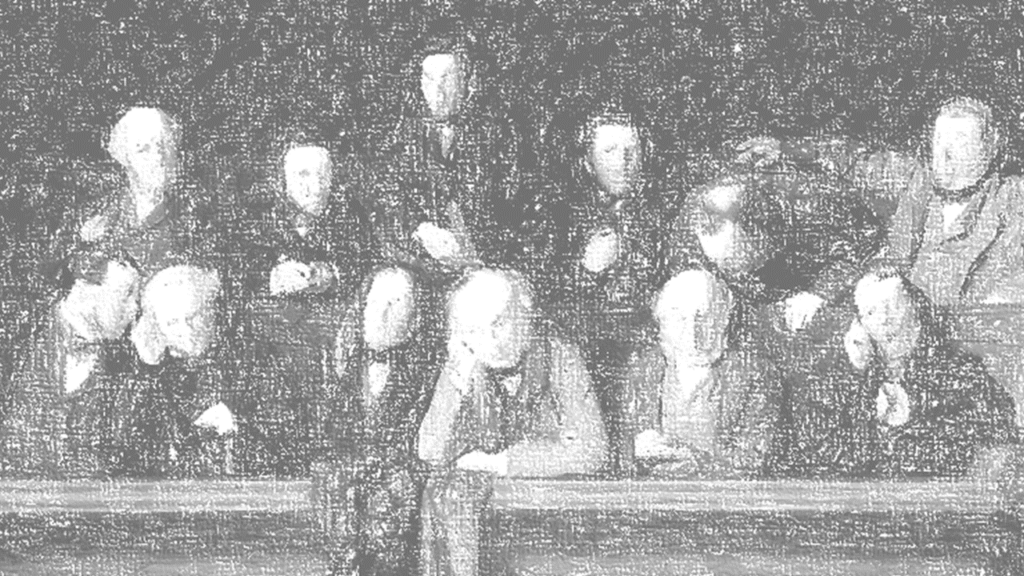
The Solicitor General opened the case for the Crown, and evidence was led to a similar effect as in Hardie’s case. Lieutenant Hodgson recognised Baird as the leader of the Radicals at Bonnymuir, and said he was in the centre of the party as they came down the hill to meet the troops. He was dressed in a brown shooting jacket, a black silk neckcloth, and worsted trousers and boots; he was rather better dressed than the rest of the party, he and Hardie. The military force consisted of sixteen hussars and an equal number of yeomanry. Private Bowler, of the 10th Hussars said that after Baird had presented his gun at Lieutenant Hodgson and it failed to go off, he went up to the wall with it, but witness did not know if he knocked the cock off it. After the troopers got through the gap in the wall, the prisoner struck one of them on the thigh with the butt of his musket.
Sergeant Saxelby swore that Baird wounded him in the arm with a pike, which he lifted from the ground when he found his musket useless. Baird fell as the soldiers entered the gap and the witness saw no more of him until he was a prisoner. In answer to the Lord-Justice Clerk, the sergeant said he was near enough to observe that when Baird’s musket was levelled at Lieutenant Hodgson the trigger was drawn. Sergeant-Major Warren also said he saw the prisoner attempting to fire at the lieutenant. Baird’s haversack, which was quite empty, was taken off him, and the ball cartridges found on the men were put into it. When Cook, the hussar, was in the witness box repeating the evidence he gave at the trial of Hardie, Mr Jeffrey said that he apprehended the prosecutor was bound, before going further, to prove that the prisoner Baird was one of the party that Cook met on the road.
The fact (as we have recorded) was that Baird was with the other party that took the canal side, and the question for discussion was whether, seeing that Baird accompanied Hardie at the battle of Bonnymuir, it was necessary to prove that he was on the road when the hussar Cook was stopped by the Radicals. A stiff argument ensued between Jeffrey and Sergeant Hullock and the bench decided unanimously that the evidence of Cook was admissible against Baird because a combination existed with which Baird was connected. Mr Jeffrey also fought over again the question of admitting as evidence the copy of the Treasonable Address which Cook received from one of the Radicals, his contention being that its identity had not been sufficiently proved, but here also the Court was against him.
The evidence of Mr J. Hardie J.P. gave rise to another collision between Jeffrey and Hullock, the former warmly protesting against Mr Hardie telling what measures he took to preserve the tranquillity of Glasgow after the appearance of the Treasonable Address. “The prosecutor,” exclaimed Jeffrey, “may bring forward all the magistrates, each with own nostrum to cure the malady; and then it will be considered whether the vis medicatriz naturae had not the most hand in it. But I submit that thus to travel into the outworks and extensive flourishes and furbelows of a case of this kind is foreign to the duty of the Court, and that the gentlemen having already proved the effects actually produced, it is in vain to inquire what any person thought on the subject.” To this Mr Sergeant Hullock retorted – “My lord, as I have heard no objection but flourishes and furbelows, and something very amusing about maladies and nostrums, if I understand the observations of the learned gentleman, I shall say nothing in reply to them.” After a little more skirmishing the question was allowed to be put and answered, but like all the evidence against Mr Hardie, it had no connection in the least with the charge against Baird. Buchanan, the changekeeper at Castlecary Bridge, told again the story of the receipt which Baird dictated when the refreshments for the Radicals were paid for.
to be continued…

